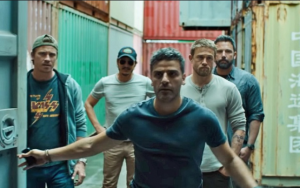TRIPLE FRONTIER: 3 ½ STARS. “half heist flick, half get-away story.”
 “Triple Frontier,” a new thriller starring Oscar Isaac and Ben Affleck, is a ‘let’s get the band back together for one last gig” movie given extra heft by its examination of the treatment of veterans.
“Triple Frontier,” a new thriller starring Oscar Isaac and Ben Affleck, is a ‘let’s get the band back together for one last gig” movie given extra heft by its examination of the treatment of veterans.
Santiago Garcia (Isaac) has his sights set on reclusive South American drug lord Gabriel Lorea (Reynaldo Gallegos). After a failed attempt to infiltrate Lorea’s circle he turns to his former comrades, a group of American Special Forces operatives, now retired. Dangling a huge pay cheque—$17,000 a week and 25% of the $75 million in cash they seize—he lures MMA fighter Ironhead Miller (Charlie Hunnam), Ironhead’s brother and gunslinger Ben (Garrett Hedlund), pilot ‘Catfish’ Morales (Pedro Pascal) and logistics genius turned failed real estate salesman Tom Davies (Affleck).
Each were hotshot Special Forces who have floundered in civilian life. “You’ve been shot five times for your country and you can barely afford to live,” Garcia says to Davies. “That’s the crime.” Once recruited they become a gritty A-Team, who, with the help of an informant (Adria Arjona), plan on raiding Lorea’s heavily fortified house—“The house is the safe.“—killing the drug lord and pocketing millions in cash. “We finally get to use our skills for our own benefit and actually change something,” says Garcia.
The carefully planned mission, however, turns into, some “full on cowboy s**t” when some of their intel proves incorrect. Hundreds of bullets later they make a hasty retreat with only their guns, their wits and hundreds of millions of dollars in duffle bags. Question is, will they complete the mission or will greed het the best of them?
“Triple Frontier” is half heist, half get-away, each section filled with equal parts tension and clichés. Director J.C. Chandor knows how to let anxiety hang in the air, creating a sense of danger that permeates the heist section. The get-a-way is more contemplative, or at least as contemplative as a movie with this kind of body count can offer. A heavy mist of testosterone hangs over both sections making this tale of men, their guns and world weariness feel like something we’ve seen before. Clichéd dialogue—“We’re dancing with the devil here!”—comes hard and fast and by the time the soundtrack blares “Masters of War” it feels as though Chandor is hitting the viewer with a metaphorical billy cub to get his message across.
Once the testosterone settles Chandor’s message of how veterans are treated once they slip out of their uniforms becomes crystal clear. As each of these war scarred men question the way the choices they’ve made with their lives, they also realize it’s the only way they know. They’ve been conditioned to behave a certain way and yet, when they retire they are left without the resources, personally or professionally, to deal with civilian life. It’s a timely and heartfelt message deftly delivered.
